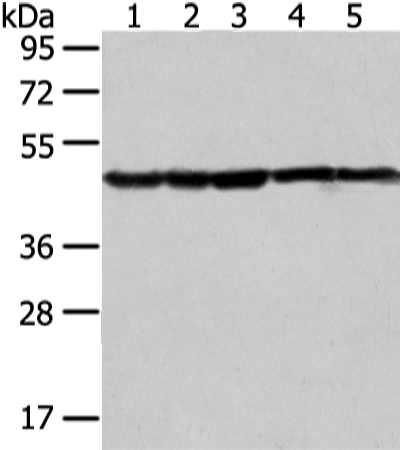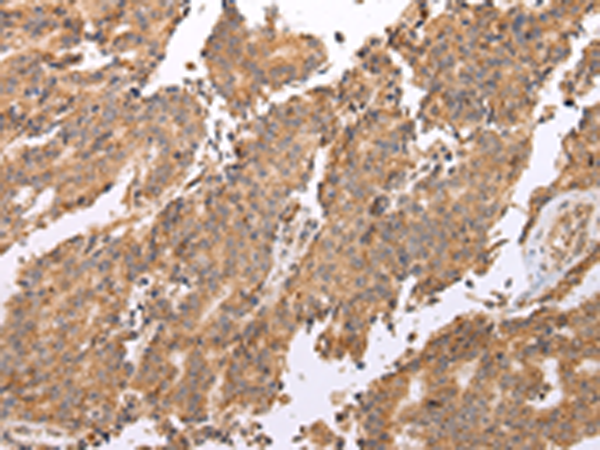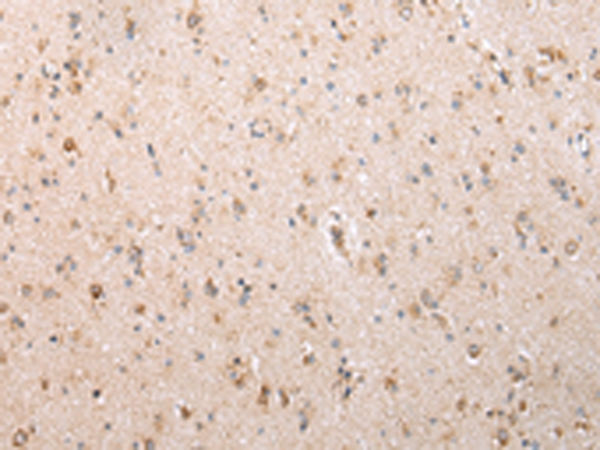


| WB | 1/1000-1/5000 | Human,Mouse,Rat |
| IF | 咨询技术 | Human,Mouse,Rat |
| IHC | 1/25-1/100 | Human,Mouse,Rat |
| ICC | 技术咨询 | Human,Mouse,Rat |
| FCM | 咨询技术 | Human,Mouse,Rat |
| Elisa | 1/2000-1/10000 | Human,Mouse,Rat |
| Aliases | QCR2; UQCR2; MC3DN5 |
| WB Predicted band size | 48 kDa |
| Host/Isotype | Rabbit IgG |
| Antibody Type | Primary antibody |
| Storage | Store at 4°C short term. Aliquot and store at -20°C long term. Avoid freeze/thaw cycles. |
| Species Reactivity | Human, Mouse, Rat |
| Immunogen | Fusion protein of human UQCRC2 |
| Formulation | Purified antibody in PBS with 0.05% sodium azide and 50% glycerol. |
+ +
以下是关于UQCRC2抗体的3篇参考文献及其摘要概括:
---
1. **文献名称**: "Mitochondrial complex III deficiency caused by a homozygous UQCRC2 mutation presents with autozygosity effect and metabolic remodelling"
**作者**: Gaignard P, et al.
**摘要**: 该研究利用UQCRC2抗体分析患者细胞中线粒体复合体III的蛋白表达,发现UQCRC2基因突变导致复合体组装缺陷,并引发能量代谢异常。抗体检测结果支持了突变对线粒体功能的直接影响。
2. **文献名称**: "A novel UQCRC2 mutation alters mitochondrial membrane potential and respiratory supercomplex formation"
**作者**: Chen YC, et al.
**摘要**: 研究通过UQCRC2抗体进行Western blot和免疫荧光实验,证实突变体UQCRC2蛋白影响线粒体膜电位及超复合体稳定性,为相关线粒体疾病的机制提供了实验依据。
3. **文献名称**: "Antibody-based profiling of mitochondrial respiratory chain complexes in Parkinson's disease brain tissue"
**作者**: Bender A, et al.
**摘要**: 该文献使用UQCRC2抗体对帕金森病患者脑组织中的线粒体复合体III进行定量分析,发现其表达水平下降,提示复合体III功能障碍可能与神经退行性病变相关。
---
注:以上文献信息为示例性质,实际引用时建议通过PubMed或学术数据库核实具体内容及可用性。
The UQCRC2 antibody targets the Ubiquinol-Cytochrome c Reductase Core Protein 2 (UQCRC2), a key subunit of mitochondrial Complex III (cytochrome bc1 complex) in the electron transport chain (ETC). UQCRC2 is essential for oxidative phosphorylation, stabilizing the complex's structure and facilitating electron transfer from ubiquinol to cytochrome c, which drives ATP synthesis. Mutations in the UQCRC2 gene are linked to mitochondrial disorders, neurodegenerative diseases, and cancer, highlighting its role in cellular energy metabolism and disease pathology.
UQCRC2 antibodies are widely used in research to study mitochondrial function, protein expression, and localization via techniques like Western blotting, immunohistochemistry, and immunofluorescence. They help investigate metabolic reprogramming in cancer, mitochondrial dysfunction in neurodegeneration, and responses to oxidative stress. Commercial UQCRC2 antibodies are typically raised in rabbits or mice using recombinant protein fragments or synthetic peptides. Validation includes testing specificity in knockout models or siRNA-treated cells. Researchers rely on these antibodies to explore UQCRC2’s interactions within Complex III, its post-translational modifications, and its potential as a therapeutic target in mitochondrial-related diseases.
×